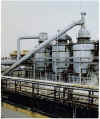|
||
| Sulphuric Acid on the WebTM | Technical Manual | DKL Engineering, Inc. |
Knowledge for the
Sulphuric Acid Industry
![]()
Sulphuric Acid on the Web
Introduction
General
Equipment Suppliers
Contractor
Instrumentation
Industry News
Maintenance
Acid
Traders
Organizations
Fabricators
Conferences
Used
Plants
Intellectual
Propoerty
Acid
Plant Database
Market
Information
Library
Technical Manual
Introduction
General
Definitions
Instrumentation
Plant Safety
Metallurgial
Processes
Metallurgical
Sulphur Burning
Acid Regeneration
Lead Chamber
Technology
Gas Cleaning
Contact
Strong Acid
Acid Storage
Loading/Unloading
Transportation
Sulphur
Systems
Liquid SO2
Boiler Feed Water
Steam Systems
Cooling Water
Effluent Treatment
Utilities
Construction
Maintenance
Inspection
Analytical Procedures
Materials of Construction
Corrosion
Properties
Vendor Data
DKL Engineering, Inc.
Handbook of Sulphuric Acid Manufacturing
Order
Form
Preface
Contents
Feedback
Sulphuric Acid
Decolourization
Order Form
Preface
Table of Contents
Process Engineering Data Sheets - PEDS
Order
Form
Table of Contents
Introduction
Bibliography of Sulphuric Acid Technology
Order Form
Preface
Contents
Acid Plant Database July 29, 2010
| Owner | Onahama Smelting and Refining Co., Ltd. |
|
| Location |
Iwaki |
|
| Background |
Major Shareholders
1963 – Company founded |
|
| Website | http://group.mmc.co.jp | |
| Plant | No. 1 Plant | No. 2 Plant |
| Coordinates* | 36° 56' 25" N, 140° 52' 55" E | |
| Type of Plant | Metallurgical | |
| Gas Source |
Copper |
|
| Plant Capacity | 500
MTPD 1300 Nm3/min (dry) |
800
MTPD 2000 Nm3/min (dry) |
| SA/DA | SA Conversion: 97% |
DA Conversion: 99.8% |
| Status | Operating | - |
| Year Built | - | - |
| Technology | - | - |
| Contractor | - | - |
| Remarks | - | |
| Pictures |      |
|
| General | Onahama Smelting and Refining Co., Ltd. as the first joint custom smelter was founded in 1963 in order to meet the steeply increasing demand for copper in Japan. The new copper smelter and refinery complex is located in Iwaki City, in Fukushima Prefecture and started its production in 1965. Since then, through sustainable development and several expansions, the plant has been operating as a clean and highly productive copper smelter and refinery yielding high-quality products. | |
| References | E. Oshima and T. Igarashi, "Recent Operation and Improvements at Onahama Smelter", The Paul E. Queneau International Symposium, Volume II, Copper and Nickel Smelter Operations, TMS, 1993, pp. 1319-1333. | |
| News |
March 10, 2010
- Mitsubishi Materials Corp., Japan’s third-largest copper producer, may run
its two domestic smelters at full capacity in the next fiscal year, in
contrast to plans by two rivals to keep production cuts, an executive said.
“At the moment, that’s the plan,” Kenichi Watase, general manager in the
Tokyo-based company’s sales department, said in an interview today. Watase
declined to elaborate as the company expects to issue its output targets for
April to September early next month. The producer planned to make 300,000
metric tons in the year ending March 31. Prices of copper, used in pipes
and cables, more than doubled in the past year as the global economy
recovered from its worst postwar recession. BHP Billiton Ltd. and Freeport-
McMoRan Copper & Gold Inc. won a 38 percent cut in 2010 processing fees from
smelters as raw material supplies tightened after China expanded capacity.
Pan Pacific Copper Co. and Sumitomo Metal Mining Co. have said they may keep
production cuts in the year from April 1 because of the lower fees.
Mitsubishi Materials operates the Onahama smelter, to the north of Tokyo,
with a capacity of 258,000 tons, and the Naoshima smelter, in western Japan,
with 225,000 tons. The company has a 50 percent stake in the Onahama
smelter. The company “is flexible on adjusting production based on the
market situation in coming months” given the reduced fees and uncertain
demand outlook at home and abroad, Watase said. “We don’t know whether a
recovery in demand from the auto sector will continue after subsidies end
later this year.” “After domestic demand plunged last year to the lowest level since 1975, we’ve seen a recovery in some sectors, including cars and semiconductors, not from overall industries,” in recent months, Watase said. The Japanese government has extended the subsidy program, which was set to expire at the end of March, for six months through September. Electric, hybrid, natural-gas, and some diesel vehicles qualify for an exemption from the country’s weight and purchase taxes. Exports to China “will depend on Chinese government policies and the price difference between the Shanghai market and the London Metal Exchange,” Watase said. “In my personal view, China’s demand growth would remain steady this year.” Asked if Mitsubishi Materials saw any change in the market for sulfuric acid, a byproduct for copper smelting, Watase said demand has recovered from fertilizer makers and mining companies. “We’ve seen good demand for the fertilizer sector in North America as the planting season for grain crops starts soon,” Watase said. Sulfuric acid supplies have been tight since early January as demand jumped after a recession slashed stockpiles held by fertilizer makers and mining, he said. The value of sulfuric acid, used to dissolve metal ore and produce fertilizer, has gone from worthless to “crazy” this year, increasing costs for mining companies, according to London-based researcher CRU Group said. Demand from fertilizer makers, normally about half of world sulfuric acid consumption, has risen as higher prices for their products prompted companies to rebuild stocks, Joanne Peacock, an analyst at CRU, said March 8. |
|
MTPD - Metric Tonne per Day
STPD - Short Ton per Day
MTPA - Metric Tonne per Annum STPA - Short Ton per
Annum
SA - Single Absorption
DA - Double Absorption
* Coordinates can be used to
locate plant on Google Earth